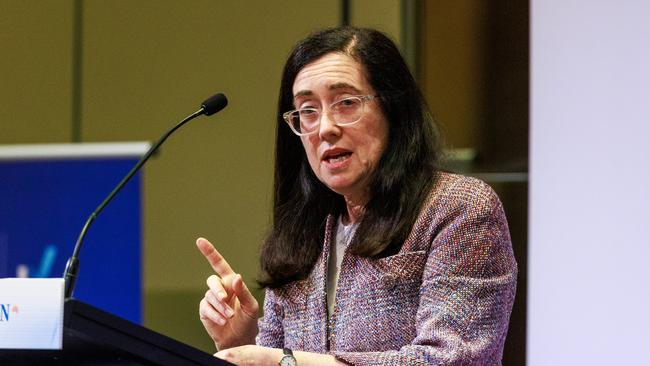
Buried in the government’s 784-page business blueprint (the industrial relations bill) is proposed legislation that will make their aims much harder to achieve.
In the case of Cass-Gottlieb, she is to have vital powers stripped from her and handed it to a body that has powers to mastermind collusion and price fixing as part of dramatic changes proposed for the transport industry, including warehousing.
I don’t believe the attack on Cass-Gottlieb by the current government is linked to her actions against Qantas, but others may have a different view.
Whereas the proposed attack on Cass-Gottlieb is direct and vicious, the attack on Bullock is strategic but places her in an awful position.
Because the government's proposed transport regulation changes will lift costs and lower productivity, prices will also rise, locking in high inflation and interest rates for much longer than Bullock and the market anticipates.

Hidden measures keep emerging in the 784-page industrial relations legislation, which is being held up by the independents in the Senate, because it is one of the most complex bills ever conceived for the parliament.
And so last month I described how the so-called “Road Safety Remuneration Tribunal” was being restored and given much greater powers to wipe out Australia’s 50,000 small independent truck drivers who not members of the Transport Workers Union.
Cass-Gottlieb is also a big target for the tribunal because currently she has the responsibility to make sure that contracts and business is conducted fairly and without collusion in all industries, including transport. She aims to increase competition, which helps Bullock restrain inflation.
In commercial contracts, road transport will become part of the labour laws and removed from Cass-Gottlieb’s supervision. This transformation in transport competition and regulation will certainly extend beyond tucking companies to into warehouses and may eventually encompass airlines.
The ACCC’s commercial activity regulation will be replaced by a complex set of bodies that pivot around the Fair Work Commission, the new Road Safety Remuneration Tribunal, the Transport Workers Union and of course the minister who has wide powers to define the ambit of the powers of the bodies to regulate commercial transport activities.

Before attempting to detail the structure of the web of bodies being established to take over and expand the existing ACCC roles, I will set out some of the new powers.
•The tribunal will have powers to control the terms of road transport contracts, which are much wider to anything envisaged in the former incarnation of the Road Safety Remuneration Tribunal and many times those currently held by a body in NSW that has some state powers in that area.
•Within the web, selected road transport businesses and contractors can establish collective labour agreements, which they can then impose on their rival transport business and contractors. These selected body agreements may even be imposed on entire supply chains.
•Once one of these agreements has been rubber-stamped by the Fair Work Commission, it is automatically exempt from the anti-competitive and price conduct prohibitions that are administered by the ACCC.
•The bill clearly allows large transport companies and big unions to enter into arrangements that, govern prices, restrict competition, allocate markets and may even allow mergers that restrict competition.
Nothing like this has ever been attempted in Australia, and I doubt whether any Western democracy has attempted such actions in a key industry like transport.
In Australia, we know that if wages are increased over an entire industry like transport and competition is restricted, then prices go up. Transport prices spread through the whole community.
The web of bodies that is proposed starts with the Road Safety Remuneration Tribunal.
Apart from the tribunal’s powers to eliminate small non-TWU truck contractors, the key function of the Tribunal is to “advise the Fair Work Commission in relation to matters that relate to the transport industry”.
In particular, the president of the FWC “must have regard” to the views of the tribunal when determining the priorities for its work in relation to broadly defined road transport industry matters.
One objective of the tribunal relates to so-called standards that aim to ensure that the road transport industry is safe, sustainable and viable.
But that’s just the start.
The tribunal is also to be empowered to recognise the “need to avoid unreasonable adverse impacts’” upon “sustainable competition” among road transport Industry participants plus business viability, innovation and productivity. In other words, everything.
The Road Safety Remuneration Tribunal’s network will include two components: a new Road Transport Advisory Group and an ‘Expert Panel’ for the Road Transport Industry within the Fair Work Commission.
Each of these bodies will have guaranteed representation from the Transport Workers Union and probably selected large trucking companies.
The unanswered question is whether Bullock and Cass-Gottlieb will take these blows lying down, or will warn the community of what’s ahead.





Outside of government ministers, arguably the two most powerful women in the Australian finance-business world are Reserve Bank governor Michele Bullock and the chair of the Australian Competition & Consumer Commission Gina Cass-Gottlieb.